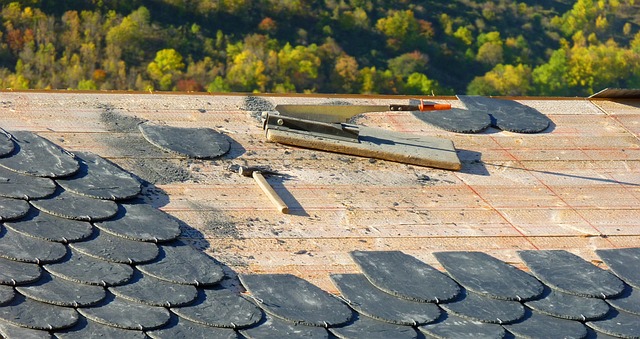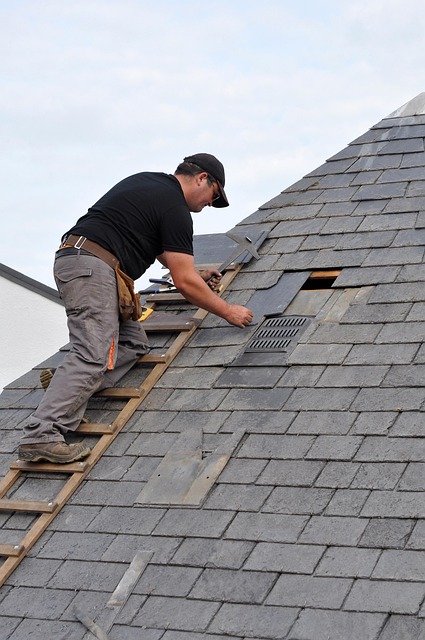For roofers, understanding and adhering to local building codes is paramount. These codes dictate material usage, installation methods, and structural integrity checks to prevent safety hazards. Compliance not only avoids legal issues but also ensures high-quality, durable work that protects both buildings and occupants. Before starting any project, homeowners and professionals must verify structural integrity, obtain permits, and stay informed about code updates through industry publications, online databases, and local government resources. Maintaining compliance throughout the project lifecycle is crucial for roofers to build a strong reputation, ensure client trust, and prevent costly legal repercussions or structural failures.
As a roofer, adhering to local building codes and regulations is paramount. This ensures structural integrity, safety, and legal compliance. This comprehensive guide delves into the essential aspects of navigating these requirements, from understanding specific codes to utilizing tools for staying updated on changes. By following best practices throughout every project stage, roofers can maintain compliance, avoid legal pitfalls, and deliver superior work that meets community standards.
- Understanding Local Building Codes and Regulations for Roofers
- Importance of Compliance: Legal and Safety Implications
- Key Areas to Check Before Starting a Roofing Project
- Tools and Resources for Staying Updated on Code Changes
- Best Practices for Maintaining Compliance Throughout the Project Lifecycle
Understanding Local Building Codes and Regulations for Roofers

Understanding local building codes and regulations is paramount for roofers looking to ensure their work meets safety standards and avoids legal issues. Each municipality or region often has its own set of rules governing construction, including specific requirements for roofing materials, installation methods, and structural integrity. Rooftop structures must be designed and installed according to these guidelines to protect both the building and its occupants from potential hazards like leaks, collapses, or fires.
Roofer professionals need to stay informed about local permits, inspection processes, and compliance standards. Failing to adhere to these regulations can result in penalties, project delays, or even the requirement to tear out and replace work that doesn’t meet code. Staying current with building codes allows roofers to deliver high-quality, safe installations that satisfy both clients and local authorities.
Importance of Compliance: Legal and Safety Implications

Ensuring compliance with local building codes and regulations is paramount for roofer professionals. Not only does adherence to these standards protect the structural integrity of buildings, but it also safeguards the safety of residents and passersby alike. Local laws and ordinances are designed to mitigate risks associated with construction and maintenance activities, from proper ventilation and material handling to emergency exit requirements and noise control. Non-compliance can lead to severe legal repercussions, including fines, project halt, or even the demolition of structures.
Moreover, compliance with building codes enhances a roofer’s reputation and fosters trust among clients. It demonstrates professionalism, expertise, and a commitment to quality work that meets or exceeds industry standards. By prioritizing compliance, roofers not only protect themselves legally but also ensure their projects stand the test of time, offering lasting protection and peace of mind for property owners.
Key Areas to Check Before Starting a Roofing Project

Before embarking on any roofing project, it’s crucial for both homeowners and professional roofers to verify several key areas to ensure compliance with local building codes and regulations. First and foremost, check the structural integrity of the existing roof, inspecting for any signs of damage or wear that could affect the new installation. This includes assessing the condition of the roof deck, fascia, and gutters, as these components play a vital role in supporting the overall structure.
Additionally, familiarize yourself with local zoning laws and building permits. Every region has specific guidelines regarding roofing materials, styles, and dimensions, especially for commercial buildings. Consulting with a licensed roofer or construction expert can help navigate these regulations, ensuring your project adheres to safety standards and avoids any legal complications.
Tools and Resources for Staying Updated on Code Changes

Roofer professionals must stay abreast of local building codes and regulations to ensure their work complies with current standards. Staying updated on code changes is crucial for maintaining safe, legally sound structures. One effective method roofers employ is subscribing to industry publications and newsletters that offer comprehensive coverage of regulatory updates across various regions. These resources provide valuable insights into new guidelines, revisions, and interpretations of existing codes, allowing roofers to adapt their practices accordingly.
Additionally, online platforms and databases dedicated to building codes offer a wealth of information at the click of a button. Many local governments and professional organizations maintain these digital libraries, making it convenient for roofers to access the latest code amendments specific to their areas. Regularly checking these resources ensures that roofers stay current, enabling them to implement best practices and avoid potential legal issues or structural failures stemming from code non-compliance.
Best Practices for Maintaining Compliance Throughout the Project Lifecycle

Maintaining compliance with local building codes and regulations is a crucial aspect of any roofing project, from initial planning to final completion. Roofers should start by thoroughly researching and understanding the specific codes and standards applicable to their region. This knowledge ensures that every step of the process adheres to legal requirements, minimizing potential delays or fines. Regularly updating this understanding as regulations evolve is essential for long-term compliance.
Best practices include keeping detailed records of all construction activities, inspections, and certifications. These documents should be easily accessible and up-to-date, allowing for quick verification during any regulatory audit. Additionally, staying connected with local building departments and industry associations can provide valuable insights into code updates and best practices, ensuring the roofer remains at the forefront of compliance throughout the project lifecycle.
When it comes to roofing projects, adhering to local building codes and regulations is non-negotiable for roosters. By understanding these guidelines, staying updated on code changes, and implementing best practices throughout the project lifecycle, professionals can ensure compliance, mitigate legal risks, and prioritize safety. This not only protects the integrity of the structure but also ensures a secure and durable roofing system that stands the test of time.
